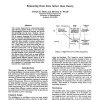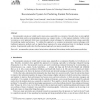12 search results - page 2 / 3 » Contextual Slip and Prediction of Student Performance after ... |
UM
2007
Springer
14 years 1 months ago
2007
Springer
A standing question in the field of Intelligent Tutoring Systems and User Modeling in general is what is the appropriate level of model granularity (how many skills to model) and h...
FLAIRS
2000
13 years 9 months ago
2000
Thecurrent frameworkfor constructing intelligent tutoring systems(ITS) is to use psychological/pedagogical theories of learning, and encode this knowledgeinto the tutor. However,t...
UM
2010
Springer
13 years 11 months ago
2010
Springer
Abstract. Recent progress has been made by using sensors with Intelligent Tutoring Systems in classrooms in order to predict the affective state of students users. If tutors are a...
PROCEDIA
2010
13 years 6 months ago
2010
Recommender systems are widely used in many areas, especially in e-commerce. Recently, they are also applied in e-learning tasks such as recommending resources (e.g. papers, books...
UMUAI
2008
13 years 7 months ago
2008
Abstract. Self-efficacy is an individual's belief about her ability to perform well in a given situation. Because selfefficacious students are effective learners, endowing int...


